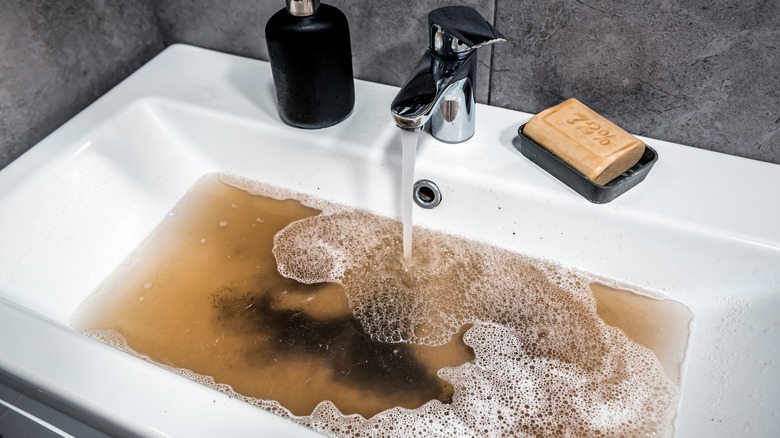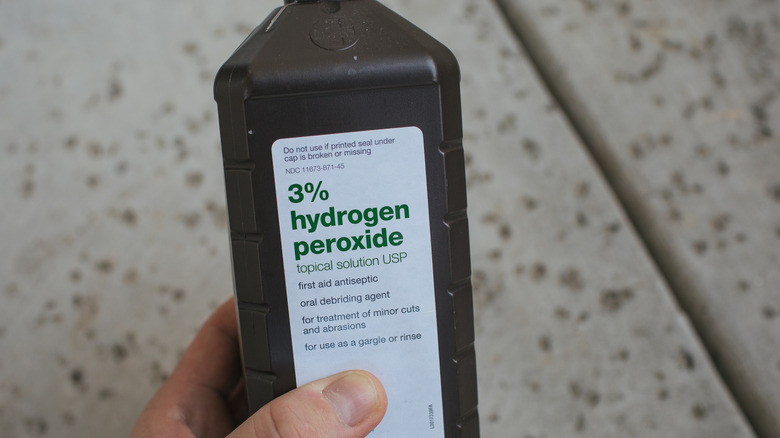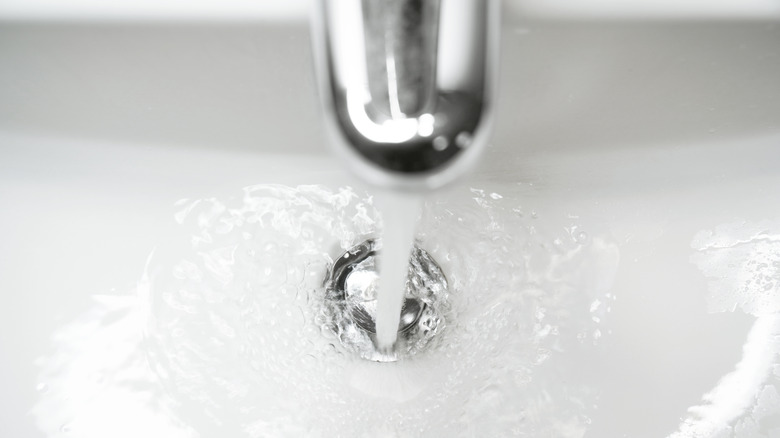The Common Household Ingredient That Can Unclog Slow-Draining Sinks And Tubs
Clogged drains seem to occur at the most inopportune times, and though you can often correct them with a quick plunge, sometimes the clog is frustratingly resistant. We've all experienced having to plunge until our arms have nearly given out and don't ever want to go through that again. The best way to avoid this is to address a slow-draining sink before it becomes a problem. Yet before you reach for a chemical-laden drain cleaner, consider a gentler and greener solution with an ingredient found in most households. Hydrogen peroxide can help unclog a slow-draining sink.
For starters, this common household item is safe. Hydrogen peroxide is also readily available at your local pharmacy. It is also much more affordable than picking up formulated drain clog removers. More importantly, unlike harsh chemical drain cleaners that can damage pipes and release toxic fumes, hydrogen peroxide is non-corrosive and biodegradable. It is also natural and environmentally friendly so that when you pour it down your drain, it doesn't introduce harsh chemicals into your plumbing system and, in effect, potentially pollute waterways.
Hydrogen peroxide breaks down organic matter in clogs
The underlying reason that hydrogen peroxide can be your secret weapon in fixing slow-draining sinks and tubs is that the cleaning agents in it slowly attack clumps of material. The liquid helps dissolve sticky accumulation in the pipes caused by organic matter. This is important because, in the bathroom, organic matter is often responsible for tub and sink clogs because hair and soap scum are often the culprits.
As it does, it allows the built-up material to break off in bits and gently make its way down the drain. When you use it on a slow sink or tub, it can essentially clean your pipes and help prevent a stubborn clog from forming. Incidentally, it can also help dissolve already-formed clogs as well. As a bonus, hydrogen peroxide kills bacteria which reduces odor, leaving your drains sparkling clean and fresh. Furthermore, it's a simple process that you can incorporate when you regularly deep clean your bathroom.
How to use hydrogen peroxide to clear out slow-draining pipes
First, you want to clear the surface, so grab a plunger and remove any visible debris clogging the drain such as hair or grime. Then pour 1 cup of baking soda down the drain and leave it there for 10 minutes. This will work as an activator for the peroxide and help loosen the clog. Then, you will need to grab 3% hydrogen peroxide. Carefully pour 1 cup of hydrogen peroxide down the drain. The mixture will fizz and bubble as the baking soda and peroxide react, breaking down the buildup in the pipes.
Next, you wait. Let the mixture sit for six to eight hours, preferably overnight. The longer it sits, the more time it has to work. The next day (or after several hours), flush the drain with hot water. This will help rinse away the loosened debris and clear out the drain. For stubborn clogs, you can follow the same steps, and if it doesn't fully work, you can repeat the process.


